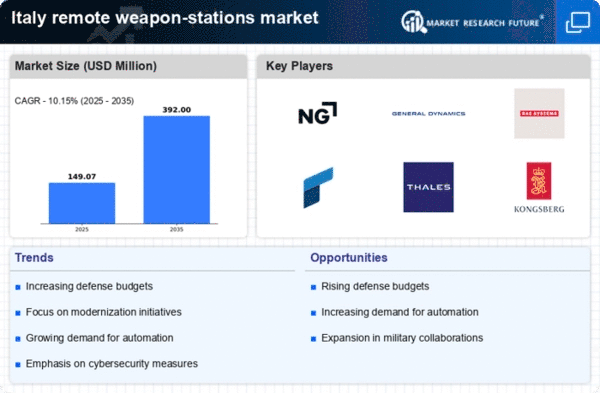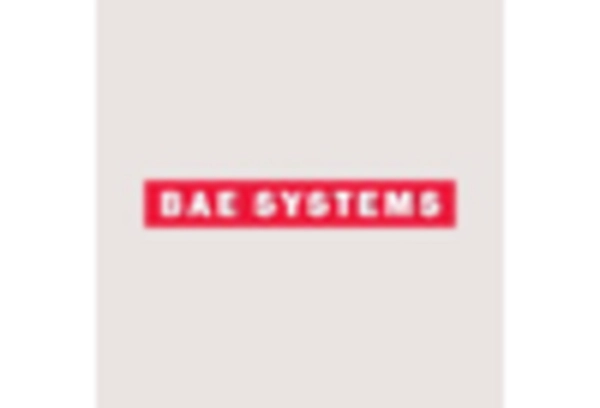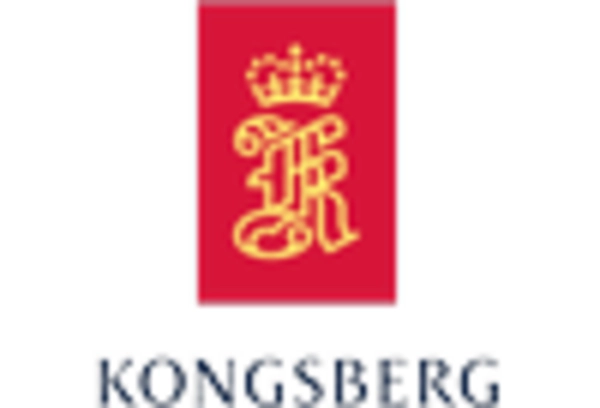Rising Security Concerns
The remote weapon-stations market in Italy is experiencing growth due to escalating security concerns. The Italian government has recognized the need to enhance national defense capabilities in response to regional threats. This has led to increased investments in advanced military technologies, including remote weapon stations. In 2025, defense spending in Italy is projected to rise by approximately 5%, reflecting a commitment to modernizing military assets. The integration of remote weapon stations into existing platforms is seen as a strategic move to bolster operational effectiveness. As security challenges evolve, the demand for innovative solutions in the remote weapon-stations market is likely to intensify, driving further advancements in technology and deployment strategies.
Urban Warfare Adaptation
The evolving nature of warfare, particularly in urban environments, is driving the remote weapon-stations market in Italy. As military operations increasingly occur in densely populated areas, the need for precision and minimized collateral damage becomes paramount. Remote weapon stations offer a solution by allowing for remote engagement of targets with reduced risk to civilians. In 2025, it is anticipated that urban warfare scenarios will influence military procurement strategies, leading to a greater emphasis on systems that can operate effectively in such contexts. This shift in operational focus is likely to stimulate demand for remote weapon stations, as they provide the necessary capabilities to adapt to modern combat challenges.
Technological Integration
The integration of cutting-edge technologies is a key driver for the remote weapon-stations market in Italy. The adoption of artificial intelligence (AI) and machine learning algorithms enhances the operational capabilities of these systems, allowing for improved target acquisition and engagement. In 2025, it is estimated that the market for AI in defense applications will reach €1 billion, indicating a strong trend towards automation and smart systems. This technological evolution not only increases the effectiveness of remote weapon stations but also reduces the risk to personnel. As the Italian military seeks to modernize its arsenal, the demand for technologically advanced remote weapon stations is expected to grow, reflecting a broader trend towards high-tech military solutions.
International Collaboration
International collaboration plays a significant role in shaping the remote weapon-stations market in Italy. Partnerships with NATO allies and other defense organizations facilitate knowledge sharing and technology transfer, enhancing the capabilities of Italian defense systems. Collaborative projects often lead to joint development initiatives, which can reduce costs and accelerate the deployment of advanced weapon systems. In 2025, Italy is expected to participate in several multinational defense programs, further integrating remote weapon stations into a cohesive defense strategy. This collaborative approach not only strengthens Italy's military capabilities but also positions the country as a key player in the European defense landscape, potentially increasing demand for remote weapon stations.
Increased Focus on Defense Innovation
The Italian government is placing a heightened emphasis on defense innovation, which is significantly impacting the remote weapon-stations market. Initiatives aimed at fostering research and development in military technologies are gaining traction, with funding allocations expected to increase by 10% in 2025. This focus on innovation encourages the development of next-generation remote weapon stations that incorporate advanced features such as enhanced targeting systems and improved mobility. As Italy seeks to maintain a competitive edge in defense capabilities, the push for innovative solutions is likely to drive growth in the remote weapon-stations market, aligning with broader trends in military modernization.
















